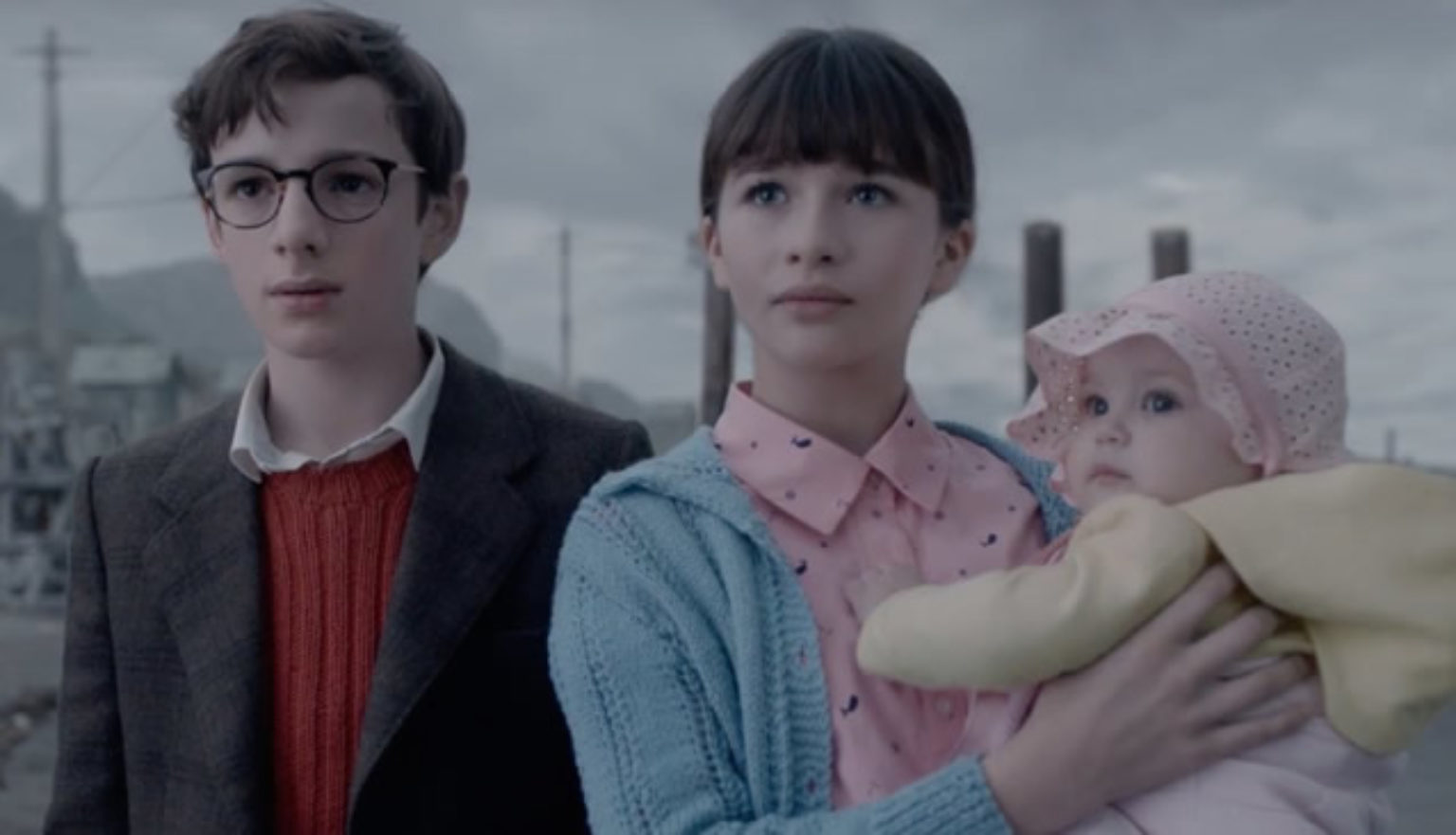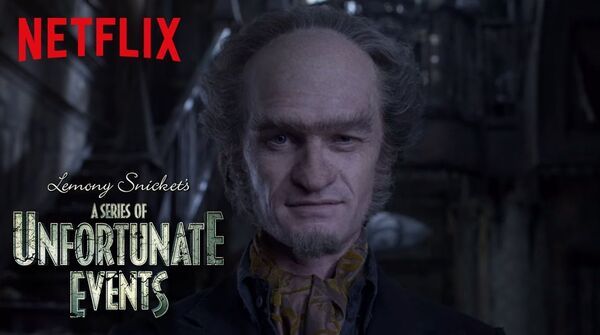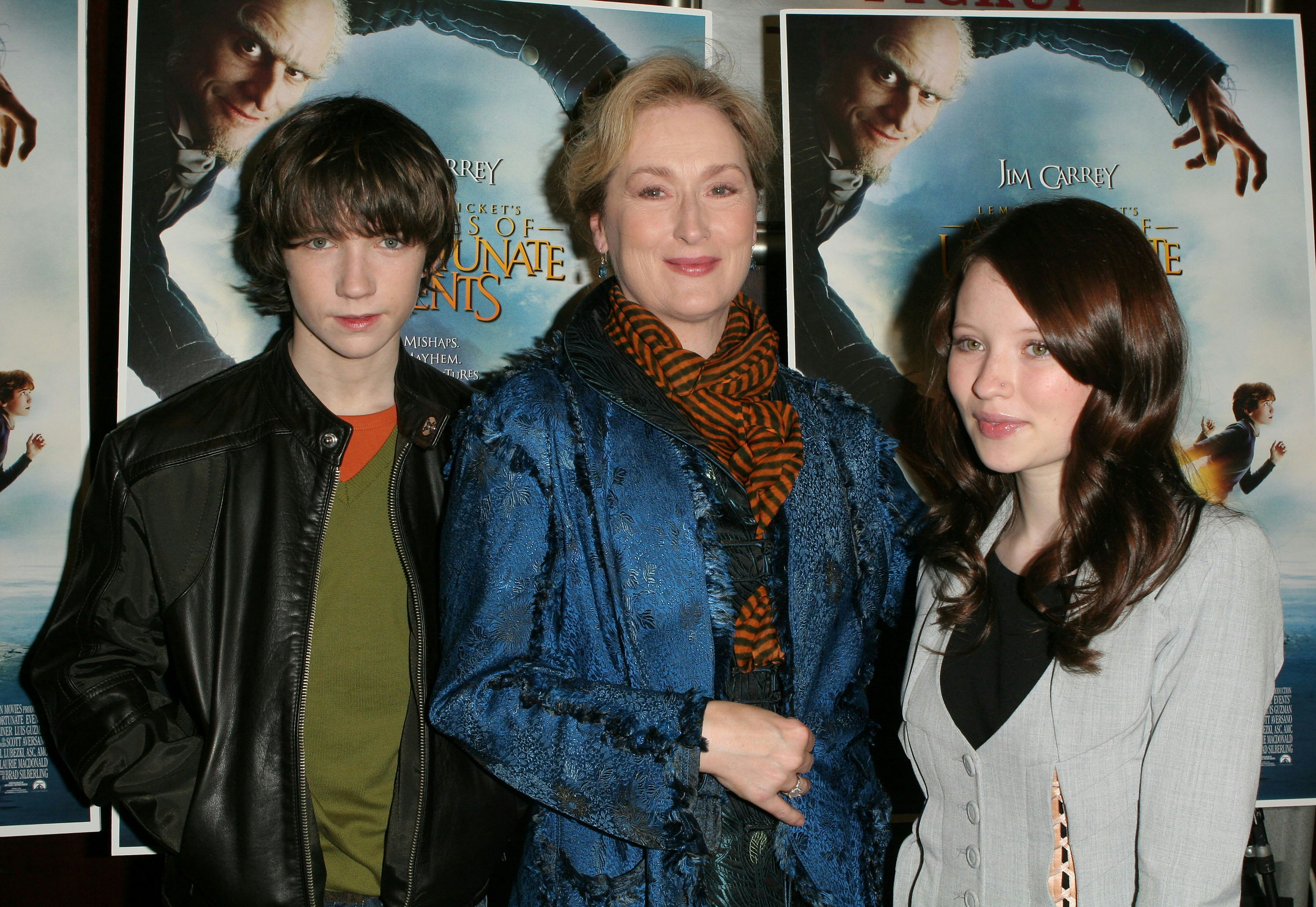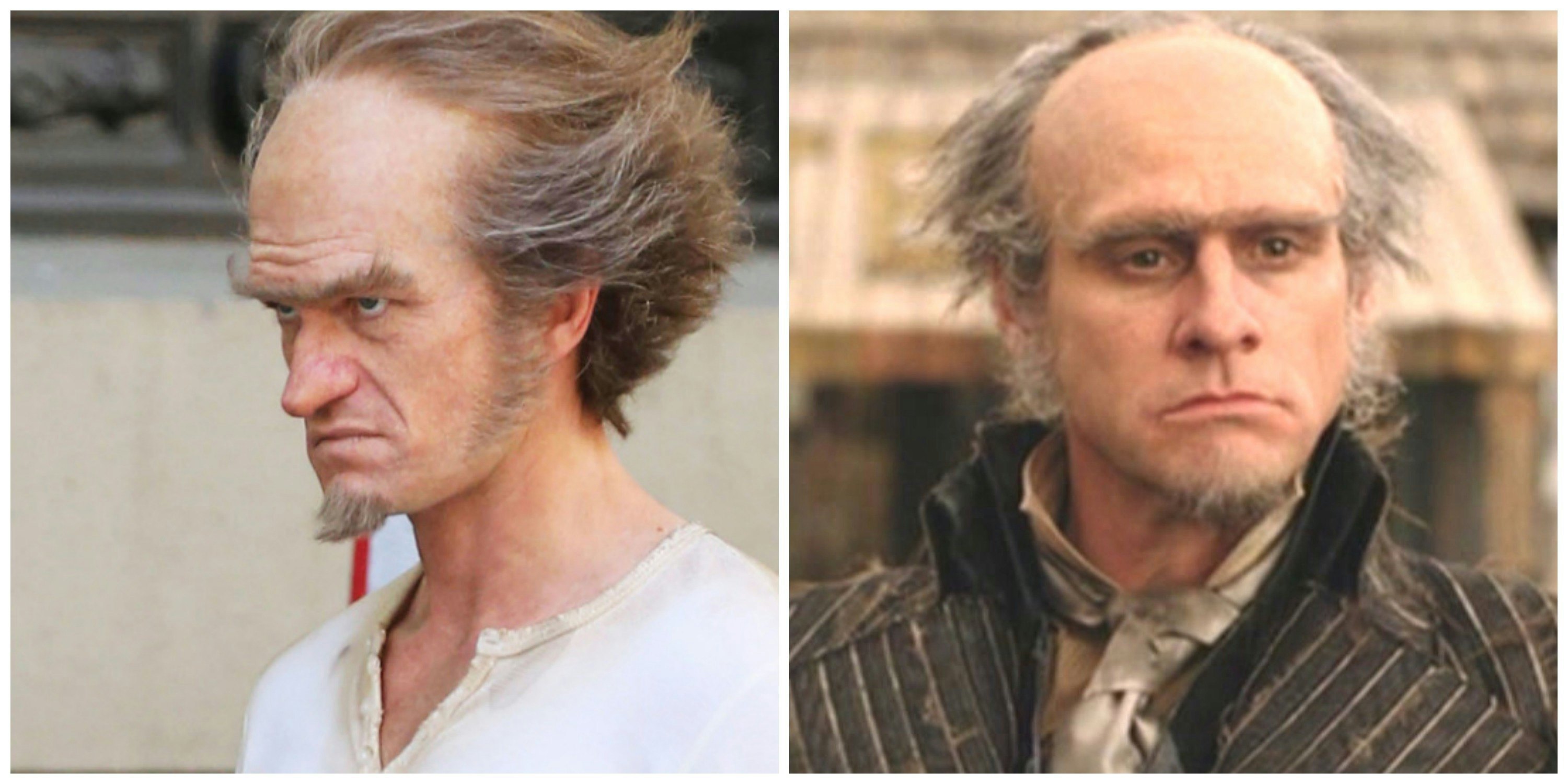Director Brad Silberling ("Moonlight Mile") takes on the challenge of translating perhaps the second most popular series of current children's books for the screen and succeeds most of the time. The world created by production designer Rick Heinrichs ("Hulk") is gloriously right and the casting of the children and their arch-nemesis is perfection, but some supporting players don't really fit the bill. Robert Gordon's ("Men in Black II") adaptation of Daniel Handler's first three books is admirable in its structure, but loses a lot of Handler's witty vocabulary lessons and adds an unnecessary conspiracy plot. So many franchises have begun with less promise, though, so Silberling has set expectations high for the future of this series. Olaf's troupe, each of whom plays a major supporting role in his deceits, aren't given enough definition in this first outing. Snicket's illustrative wordplay, which make the books witty and educational, is pared back to a minimum.
Sunny's 'monkey talk,' theoretically translated on the page, is accompanied by amusing subtitles on the screen. Brett Helquist's cunning illustrations for the Lemony Snicket books are almost as important as the words within, but they implant a definite look for the characters and environs in the reader's mind. Heinrichs and his art directors have clearly taken them to heart to give the film a fantastical gothic look, much like something one would expect from a Tim Burton film.
Costume design by Colleen Atwood and Donna O'Neal ("Big Fish") embellishes upon the pencil drawings to good effect, particularly in the fishnet sleeves of Violet's dress which create a waifish vulnerability. Jim Carrey brilliantly immerses himself into Helquist's Olaf - he's all odd angles, physically exaggerated. Browning and Aiken have been beautifully cast as siblings and both are extremely photogenic, even with the grave expressions the Baudelaires usually carry. Director Silberling coaxes an actual performance from the twins, too, who often provide the film's punch lines . However Catherine O'Hara ("Surviving Christmas") is all wrong for the grandmotherly Judge Strauss, just as Meryl Streep seems wasted as Aunt Josephine .
Cedric the Entertainer ("Barbershop 2") adds some heartiness to the proceedings but is miscast as a Victorian era British police detective. Character actor Spall easily inhabits the skin of the blustery banker. Connolly is a likable eccentric for his few scenes, but pity Luis Guzmán ("Anger Management"), Jennifer Coolidge (TV's "Joey"), Jane Adams ("Eternal Sunshine of the Spotless Mind"), Craig Ferguson ("Saving Grace") and Jamie Harris ("Rick") as Olaf's unsavory troupe.
The Bald Man, two White Faced Women, Person of Indeterminate Gender and Hook-Handed Man almost disappear into the background. In what may be an in joke, Dustin Hoffman ("Finding Neverland") cameos as a theater-goer who marvels at Olaf's theatrical budget. "Lemony Snicket's A Series of Unfortunate Events" isn't quite the transporting experience I had hoped for, but it gives every indication that the possibility lies ahead. I never read the book series before I saw this, and while this was sort of a unique and bizarre movie, I didn't really find it too interesting and of course it was highly predictable.
I guess the surreal atmosphere was sort of cool and Carrey's character is certainly interesting, but I guess this really just didn't have the same level of character development or depth as the books. This just felt like some odd, low budget children's movie with a unique atmosphere, but somewhat rushed plot and poorly executed character development. I did end up actually reading a few of the books a few months after seeing this and realizing the books were a bit more elaborate and focused more on the characters rather than the bizarre situations.
I remember seeing this with my friend and he actually enjoyed this a lot, but he was only in 8th grade at the time and when you're in 8th grade, you tend to be easily impressed. He was not familiar with the series when he was first approached. He quickly read the first three novels and was excited that "Hollywood was taking a chance to put over $100 million to adapt these inventive children's books onto screen". Handler, who wrote eight drafts of the script for Sonnenfeld, was replaced by Robert Gordon in May 2003.
Handler approved of the changes that were made to his original screenplay. "I was offered credit on the film for screenwriting by the Writers Guild of America," Handler continued, "but I didn't take it because I didn't write it. I felt like it would be an insult to the guy who did." There are quite a few differences between the books and the film.
Many of these involve some dark content being toned down, while others are related to time restrictions common to most book-to-movie conversions. Perhaps the biggest change in the film is the movement of The Marvelous Marriage. In the book, this scene takes place near the end of the The Bad Beginning. In the film, the wedding takes place at the end of the storyline of The Wide Window. According to the DVD commentary, this was changed to give the film a better climactic ending.
However, in the book, the wedding was one of the main reasons for the removal of Count Olaf's guardianship of the children. Therefore, a small scene was added in the movie in which Olaf tries to kill the Baudelaires by stopping his car on the rail track at the Last Chance General Store's gas station, locking them inside, and waiting for the train to come. Daniel Handler initially viewed Count Olaf as being a James Mason-type. Carrey was not aware of the book series when he was cast, but immediately became a fan. "Handler's books are just a bold and original way to tell a children's story." the actor explained. Carrey was also attracted to the role over self-parody concerns.
Director Brad Silberling was open to Carrey's idea of improvisation for various scenes, especially the Stephano and Captain Sham alter egos. In an attempt to make his prosthetic makeup more comfortable and easier to apply, Carrey shaved his head bald for the part. The actor's inspiration for Olaf's voice was a combination of Orson Welles and Béla Lugosi. Author Daniel Handler initially viewed Count Olaf as being a James Mason-type.
Carrey was not familiar with the book series when he was cast, but he became a fan of the series. "Handler's books are just a bold and original way to tell a children's story," the actor explained. Carrey was also attracted to the role despite self-parody concerns. To make his prosthetic makeup more comfortable and easier to apply, Carrey shaved his head bald for the part. The actor's inspiration for Olaf's voice was combining the voices of Orson Welles and Bela Lugosi. When they are sent to a distant relative, they find out that he is plotting to kill them and seize their fortune.
While talks of continuing the story in a potential film series remained open for a time, executive shake-ups at Paramount and the younger cast visibly aging ultimately led to this film, unfortunately, being the end of the line, in spite of modest financial success. Years later, plans for another adaptation found new life with Netflix, as the streaming giant carried through on its idea to convert the books into a television series that adapted all 13 books in the series. LEMONY SNICKET'S A SERIES OF UNFORTUNATE EVENTS is based on the first three books in a series of popular children's books. The story opens with the three Baudelaire children learning that their parents have died in a massive fire, which destroyed their home. Mr. Poe, the executor, first places them with their nearest relative, Count Olaf, played by Jim Carrey. The Count is an outrageously bad actor who makes it clear that he wants the Baudelaire fortune and is willing to kill to get it.
The three children use their own personal talents to escape Count Olaf's clutches, but he pursues them as they are placed with other distant relatives. This gloomy children's book series by Daniel Handler has been quietly gaining a worldwide following among both children and grown-ups, with 11 books having hit the shelves in the time it takes JK Rowling to sharpen her pencil. Brad Silberling's big-screen Snicket surpasses the early Potters, bolstered by a set of memorable performances and its atmospheric, Burtonesque visuals. The devotion to Handler's source material is certainly gratifying for series devotees, but it can be a lot for new viewers to take in.
The best cultural parallel is another children's book adaptation, the Harry Potter films. Nickelodeon Movies purchased the film rights to Daniel Handler's book series in 2000 and soon began development of a film with Barry Sonnenfeld attached to direct. Handler adapted the screenplay and courted Jim Carrey for Count Olaf. Sonnenfeld eventually left over budget concerns in January 2003 and Brad Silberling took over.
Robert Gordon rewrote Handler's script, and principal photography started in November 2003. A Series of Unfortunate Events was entirely shot using sound stages and backlots at Paramount Pictures and Downey Studios. The film received positive reviews, with many praising its production values and performances (particularly Carrey's performance), while some criticized its comical tone and short length – only focusing on the first three books in the series. The film also grossed $211 million worldwide and won the Academy Award for Best Makeup. The new show is getting rave reviews, which is fortunate for fans of the books, as the first attempt to bring the story to the screen in 2004 was less successful. The first three books of the series were adapted into a film starring Jim Carrey.
The movie was a flop at the box office and with most critics and fans. After their parents are killed in a fire at the family mansion, Violet, Klaus, and Sunny Baudelaire are left in the care of Count Olaf, a sinister distant relative, who wants his hands on the Baudelaire family fortune. As they survive numerous attempts on their life, and a variety of bizarre events, the orphans will learn just how bad reality is.
With the Harry Potter-series, each film span out a year and they didn't stop for some years after each film. The entire book series of "A Series of Unfortunate Events" span out for about 4 months. So even if you're going to do the movies in threes, you would still see the kids grow several years.
In 2017, 11 years after Lemony Snicket finished his chronicling of the Baudelaire children's misadventures, Netflix released the first season of A Series of Unfortunate Events. The television program, which finished after three seasons, faithfully adapts the book series to its complete story, while also expanding the world of the novels with new characters and other intriguing details. Parents need to know that this movie may be upsetting to some kids. The children in the movie are orphans who are continuously mistreated. There are constant scenes of peril and tension; though most of the violence is offscreen, we see the aftermath. An adult strikes a child and there are other assaults and murders and an apparent suicide.
There is one scary surprise and several shots of creepy creatures, including rats, bugs, bats, and snakes. Some children will understand that this is intended as macabre humor but others will not, so parents should be particularly cautious about deciding whether the film is appropriate for their kids. Other parental concerns include some very crude language "said" by a baby ("shmuck," "bite me"), and a forced marriage with a 14-year-old . Author Daniel Handler first launched the Series of Unfortunate Events novels in 1999, writing under the pseudonym "Lemony Snicket," who narrates in both his series and Netflix's show.
In 2004, Nickelodeon adapted the first few Snicket books into a theatrical movie, starring Jim Carrey, that was intended to launch a film franchise. But the film failed to take off at the box office, and the planned sequels were canceled. Now the books are getting the Hollywood reboot on Netflix, with an initial season that fittingly releases on Friday, January 13th. If you had an adolescent fascination with melancholia or were sadistically thrilled by bad things happening to good people, A Series of Unfortunate Events was the children's book series for you.
And now, the Netflix trailer for A Series of Unfortunate Events , the TV show, promises to bring that bleakness back into 2017. And honestly, I think I can get some joy out of the stylistic promise in this trailer, as it takes some interesting steps away from the 2004 film. As a fan of Snicket's books, I was disappointed to see the film series end so abruptly.
I thought that the episodic nature of Snicket's books would work well as a television miniseries, which became the basis for this project. My project includes two full scripts (adapting two books from Snicket's series) as well as a character list, an episode outline for the entire series, and a list of possible production schematics. The introduction contextualizes my project in terms of other book-to-television adaptations and allows for personal commentary on my adaptation process. Lemony Snicket's A Series of Unfortunate Events, a series of 13 children's books, seemed like it had the potential to become a massive franchise in a similar vein to the Harry Potter film series. Snicket's books feature three plucky protagonists, a sinister villain, and constantly-shifting settings—all elements that could make a successful movie series.
A film adaptation, titled Lemony Snicket's A Series of Unfortunate Events was made in 2004. It adapted the first three books in the series, and became a moderate financial and critical success. Of course, this isn't the first adaptation of the Snicket-verse. In 2004, a few years before the books wrapped up, Brad Silberling made a movie based on the series that functioned primarily as a Jim Carrey vehicle. It was received fairly well, but not well enough to inspire faith in a sequel, leaving the story hastily concluded and dangling at the same time.
The film is now regarded with mixed feelings; it does operate neatly as an off-kilter family adventure, but in terms of adaptation it's rather fluffy. Mr. Poe takes them to live with their "closest relative," a fourth cousin three times removed or perhaps it's the other way around. This is Count Olaf , who lives in a Gothic mansion so creepy his interior decorator must have been Nosferatu.
The Count wants to kill the children and inherit the family fortune, and is not very subtle in his methods, parking his ancient Imperial on the train tracks with the children locked inside. As there are 11 novels so far in the series, they necessarily escape. And the film "Lemony Snicket's A Series of Unfortunate Events" opens on the same note, with Lemony Snicket himself bent over an old typewriter and typing out the dire story of the three Baudelaire children who suddenly and decisively become orphans. The family banker, Mr. Poe , breaks the news that a fire has destroyed their mansion and killed their parents. It may surprise some, but the Unfortunate Events series by Lemony Snicket are wildly popular with school-age kids, though they may horrify tender-hearted parents.
There is one major exception, however, when it comes to the show emulating the books — Neil Patrick Harris' Count Olaf is given plenty of freedom to extemporize in bringing the character to life, to mixed results. Early on, the character doesn't feel like a menacing villain — he's just clearly Neil Patrick Harris wearing scary old-man makeup. His delivery and mannerisms are almost unchanged from those of say, Barney Stinson. Harris leans so far into the same mock-outrage that his early segments feel like How I Met Your Mother outtakes, complete with a slightly out-of-place musical number in the second episode.
However, by the third episode, as Olaf's schemes get more ridiculous, Harris' hammy performance works in his favor. The surreal nature of the character's ridiculous disguises — which only the Baudelaire children seem to be able to penetrate — and Olaf's single-minded drive to possess their fortune give Harris an outlet for his own humor. The comic touch makes the moments when he takes off the mask and reveals Olaf's cold, dark heart far more effective. Where the film adaptation diverges significantly from the books, Netflix's series follows the text almost verbatim, which is a double-edged sword. The heavy use of narration is an iconic aspect of the novels, and for longtime fans, it's great to see it on-screen. But it also serves a crutch, allowing the script to tend toward rambling exposition dumps that tell the story rather than show it.
The show also makes the wise move of having Lemony Snicket — the books' fictional author and unreliable narrator — appear in the show instead of providing an unseen voiceover. Patrick Warburton's deadpan, matter-of-fact delivery helps add a storybook quality, and more importantly, it puts Handler's memorable monologues about linguistic definitions, literary references, and storytelling techniques on-screen. The books' metafictional nature has always been one of their most compelling elements, and the show's embracing of Snicket as a full-blown character gives it the same distinctive tone that made the novels so popular. Individual novels rarely end on upbeat notes, and Snicket's narration is quick to remind readers that the Baudelaires' story isn't a happy one.
Characters are complex and morally gray, and as the series progresses, both the heroes and villains are forced to make choices that blur the lines between them. The world-building is rich with mysterious groups lurking in the background, and a deep interconnected backstory spanning the entire series for attentive readers to uncover alongside the Baudelaire orphans. While the current Netflix episodes only cover a comparatively short chunk of the overall series, it's clear that they were produced with a great deal of care to ensure the feel of the books made the jump to the screen. Nickelodeon Movies purchased the film rights to the A Series of Unfortunate Events novel series in May 2000. Paramount Pictures, owner of Nickelodeon Movies, agreed to co-finance, along with Scott Rudin.
























